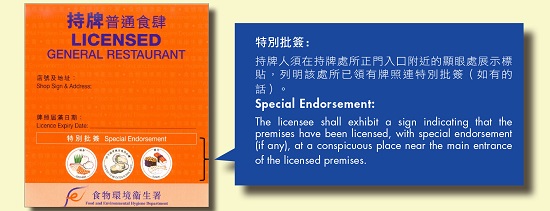
  |
Food Safety Focus (118th Issue, May 2016) – Incident in Focus
Raw Aquatic Food Products – A Source of Pathogens and Parasites
Reported by Mr. Johnny CHU, Scientific Officer,
Risk Assessment Section,
Centre for Food Safety
Last week, media reported that some local restaurants prepared and sold ready-to-eat raw drunken/marinated crabs, shrimps, cockles and the like, albeit without a restricted food permit from the Food and Environmental Hygiene Department (FEHD) for selling sushi and sashimi (see Figure). In Hong Kong, consumption of raw aquatic food products has been considered one of the causes of food poisoning.

FEHD licence with special endorsement for sale of sushi and sashimi
Hazards Associated with Raw Aquatic Food Products
Parasites
According to the Food and Agriculture Organization of the United Nations, parasites are more likely to be present in wild caught aquatic animals and certain aquaculture fish if the fish is not fed exclusively on a diet free of parasites. The parasites that are of most concern include flukes (liver flukes and lung flukes), roundworms (e.g. Angiostrongylus cantonensis) and tapeworms (e.g. Diphyllobothrium spp.). Some freshwater crabs and snails are known to be infected with lung flukes and roundworms respectively while fish may be infected with liver flukes and tapeworms.
Bacteria and Viruses
The harmful microorganisms of concern include both bacteria (e.g. Vibrio parahaemolyticus (VP) and Vibrio cholerae (VC)) and viruses (e.g. norovirus). VP occurs naturally in seawater (estuaries and coastal areas). Hence, some seafood is inevitably contaminated with VP. On the other hand, VC can live in both saltwater and freshwater such as rivers. In Hong Kong, norovirus is a prevalent foodborne virus that is commonly found in polluted seawater and shellfish living in polluted areas is easily contaminated.
Public Health Significance
Roundworms may embed in the intestinal wall and cause nausea, vomiting, diarrhoea, and severe abdominal pain and sometimes may penetrate the intestine. Tapeworms, which may grow to many feet in length, can cause abdominal swelling and abdominal cramps and may lead to weight loss and vitamin B12 deficiency anaemia. Heavy aggregates of parasitic worms can also cause intestinal blockage, particularly in small children. Besides causing abdominal discomfort and diarrhoea, liver flukes and lung flukes may migrate to the liver and lung respectively and sometimes lead to serious complications in other vital organs such as hearts and brains.
VP is amongst the top food poisoning agents in Hong Kong. Symptoms include abdominal pain, diarrhoea, vomiting and sometimes mild fever. Cholera, an acute diarrhoeal disease, is caused by the bacterium VC. Although not commonly reported nowadays in Hong Kong, cholera can cause profuse diarrhoea and, without prompt treatment, may lead to dehydration and death. Worldwide, norovirus is recognised as the most important cause of non-bacterial outbreaks of gastroenteritis. Consumption of contaminated raw oysters is an important cause of norovirus infection locally. Symptoms may include nausea, vomiting, non-bloody diarrhoea and abdominal cramps. Secondary person to person spread may occur.
Preventive Measures
1. Avoid consuming raw marinated aquatic food products
Raw fish and crabs may contain harmful bacteria and parasites while shellfish are more commonly contaminated with harmful bacteria and viruses. Using ingredients such as wine, vinegar, soy sauce, garlic, chilli to marinate fish and crabs cannot effectively kill harmful microorganisms and parasites. Hence, marinated raw crabs (e.g. drunken crabs), raw fish (e.g. ceviche), raw shrimps (e.g. Thai-style shrimp sashimi) and raw cockles (e.g. drunken cockles) have been reported to cause food poisoning.
2. Avoid consuming undercooked aquatic food products
In some regions, light-cooking (or quick-boiling) of shellfish such as cockles is claimed to be able to keep the fine flavour of the shellfish. However, consumption of undercooked shellfish is also a cause of food poisoning because light-cooking cannot effectively destroy harmful microorganisms and parasites.
Some facts you should know :
-
In South Korea, nationwide survey data showed that infection caused by the lung fluke had been common in 1960s, becoming less prevalent in the 1990s, but has re-emerged since 2000s.
-
In the summer of 2006, over 130 people in Beijing were infected with parasitic roundworms (i.e. Angiostrongylus cantonensis) after eating undercooked snails.
-
In 1988, over 290 000 cases of Hepatitis A were reported in Shanghai due to the consumption of raw or partially cooked cockles.
Cooking aquatic products thoroughly is the only way to prevent diseases caused by harmful microorganisms and parasites.
Regulatory Control
In Hong Kong, food premises holding a general restaurant or food factory licence have to obtain relevant permission from FEHD in the form of endorsement onto the licence for manufacturing and sale of sushi and sashimi. Others who want to sell but not manufacture sushi and sashimi also need to obtain a restricted food permit. No matter selling of restricted food online or by traditional means, operators should, with regard to their mode of operation and the types of restricted food offered for sale, obtain relevant licences/permits as required by the law.
Key Points to Note:
- Marinating raw aquatic food products with wine, vinegar, etc. cannot effectively kill bacteria and parasites.
- Cooking aquatic food products thoroughly is the only way to prevent diseases caused by harmful microorganisms and parasites.
- Food premises holding a general restaurant or food factory licence have to obtain special endorsement for manufacturing and sale of sushi and sashimi.
Advice to the Trade
- Ensure that the products are fit for consumption and in compliance with relevant legislative requirements.
- Obtain relevant licence/permit from FEHD for manufacturing and/or sale of sushi and sashimi.
- Avoid serving raw or partially cooked crabs, snails, cockles and the like.
Advice to the Public
- Avoid eating raw or partially cooked crabs, snails, cockles and the like.
- Check whether the premises have a FEHD licence or permit for sale of sashimi and sushi before patronising or ordering.